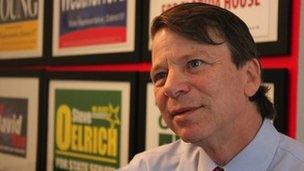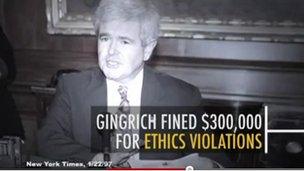Can you buy an election in the US?
- Published
- comments

"Campaigns are ultimately about contrast," says media consultant Adam Goodman
Newt Gingrich's face fills the screen, about as attractive and trustworthy as a police mugshot.
This is one of the adverts, external run by Mitt Romney's campaign. It questions Newt's record and integrity.
Adam Goodman points out that everything in the advert is grey and grainy, with all the words in red and dark brown, except for the picture of Mitt Romney at the end. He is rendered in bright colour alongside his smiling family.
We are in the studios of The Victory Group, external, Adam's media consultancy. Victory Group has designed many campaigns and adverts for Republican candidates.
He defends what some call negative advertising.
"I like to think of it as conversational advertising. People ask all the time: 'Is this good for the process?' I think it is tremendous for the process. The more that you get voters engaged in winners and losers it is all for the better."
But is it positive to paint your opponent as a bad guy?
"Campaigns are ultimately about contrast," he says. "You basically want to lay out your case as you best you can. I think the exchange of ideas, the exchange of records, the exchange even of character, is terribly important in making informed choices."
New rules, new funds
It certainly worked in Florida.
Mitt Romney ran 13,000 adverts, nearly all negative, nearly all on TV. You are sitting there, watching your favourite chat show or reality TV, and up pops a minute-and-a-half of adverts telling you scary things about somebody.
One insider says the experience is like having someone invade your home. But he also told me that people do get interested, caught up in the emotion, and of course persuaded of the merit of the advert's argument.
The ads certainly seemed to crush Newt Gingrich in Florida, where he could only manage to buy a measly 200 spots on TV.
Negative TV ads are nothing new in American political campaigns. The relationship between money and politics is an old story. But something new is happening in this election year.
Two years ago the Supreme Court ruled, external that under the First Amendment of the US Constitution corporations and unions had the same rights of free speech as individuals.
That meant they had the right to spend as much as they liked on political campaigns.
That ruling gave birth to the Super PAC, external (political action committee).
Although the law does not allow a candidate to control a Super PAC, the committee in charge can take notice of what he or she says in public. So somehow, by some miracle, they are all bang on message.
Prepare for the ad-storm
Super PACs can be richer than the candidate's own campaign.
Take the pro-Mitt Romney Super PAC Restore Our Future, external. It raised more than (£14.5m) last year, compared to the Romney campaign's $20m.

A screenshot of an anti-Newt advertisement from Restore Our Future
Four hedge fund managers gave a million dollars each to Restore Our Future, and 10 billionaires, external are listed among the supporters.
Adam Goodman says there will be yet more money spent this year.
"It keeps going up. Every cycle. Sometimes it goes up astronomically. The difference this year are the Super PACs," Mr Goodman says.
"The frightening part is that we have only seen this played out in the presidential [election]. It is about to be played out in every race for the senate, every race for Congress.
"It's great for business but very chilling in a way in terms of democracy because it may suggest fewer people are having more power over the process than ever before."
The Democrats don't seem to be tapping into the potential power of the Super PACs. Obama-supporting Priorities USA, external raised a rather pathetic $4.4m.
Obama won't worry too much, though: his campaign has raised $220m last year.
And this primary campaign is only a little taster for the feast of negative advertising to come.
As autumn approaches, TV viewers will be bombarded by a barrage of ads attacking Obama and the Republican candidate.
Both sides have the cash to make this very nasty indeed.